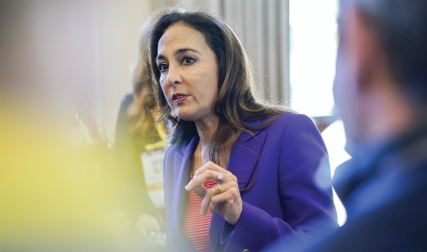A Sense of Wonder
Thank you for the inspiring May/June issue. The well-written stories about the Rev. Steve Blackmer ’79 [“Nature Worship”], Galia Benartzi ’04 [“The Future of Money”], and Theresa Menders ’88 [“Ideal Exposure”] gripped my imagination and raised my spirits.
Each one in unique ways is binding us together, not splitting us apart. They are bonding us to a deeper human community with great sensitivity to the flaws in our world.
The seven alumni featured in the “Pursuits” department increased my joy. The gifts of their pursuits are strengthening our common community with justice, the arts, and service.
The cover photograph of the back of the Rev. Blackmer was one of the most provocative covers I have ever experienced. It drew me into his world and made me wonder.
Charles F. Pierce ’58
Winter Springs, Florida
Leap of Faith
It was surprising that in a 2,805-word article purportedly about salvation and redemption in nature [“Nature Worship”], the name Jesus is mentioned only twice and only because of His relationship with trees, retreating to the groves and orchards for contemplation and then ultimately to be hung on a cross—“a tree stripped of its healing leaves.” To clarify for those who may not have read the Bible, Jesus did all the healing, not trees or leaves.
I commend Rev. Blackmer for taking a huge leap of faith from his former occupation into the clergy. The article seems to indicate he was an unlikely candidate for his new calling. That said, the Bible contains grave warnings against false teachings. The article’s title, “Nature Worship,” is 100-percent accurate, but the implied path to redemption via contemplative time in nature is 100-percent antithetical to the message of Christ’s dying on the cross.
I would encourage seekers of salvation and redemption to get to know Jesus Himself, whether in a forest, desert, island, plane, train, or automobile, rather than lose sight of the forest for the trees.
I searched scripture for the wisdom of King Solomon and King David on how they might reply to this misrepresentation of God’s Word, but, alas, the Holy Spirit advised I put it into secularized laymen’s terms, so in the words of Ron Swanson of the TV comedy series, Parks and Recreation, “There’s only one thing I hate more than lying: skim milk. Which is water that’s lying about being milk.”
Let’s keep the main message the main message and not water it down.
Adam Heaney ’93
Santa Ana, California
Your cover story on the Rev. Stephen Blackmer and his nature worship proves once again that boutique religion, though popular these days, is just plain silly, or, to use Blackmer’s vernacular, f****** silly.
Elmer L. Sullivan ’52
Ewing, New Jersey
The Crypto Economy
“The Future of Money” is a very interesting article that points to a future with decentralized and distributed money. The decentralization of energy (electricity) and the continuing decentralization of information will be next. This is important, as it reasserts the primacy of cooperation and the commons.
By implication, it rejects the false narratives of economist Friedrich Hayek and writer Ayn Rand, who brought us the disaster of neoliberal economics.
One has only to look at our current situation of radical inequality and the rapidly disintegrating environment to understand why we must reject neoliberal economics. It is imperative that we restore cooperation and the commons as fundamental components of a 21st-century economy.
Jock Gill ’67
Peacham, Vermont
Lasting Legacy
Your profile of Paul Tsongas ’62 [“Mr. T,” May/June] reminded me that when I interviewed him in 1987 for a 25th reunion project, he said about his cancer, “When you go through what I’ve been through, you take it one day at a time, and you cannot be terrorized any more. You get nervous, but the fear factor is pretty much gone.” Paul was fearless in all that he did. We can still learn from him.
Ross Burkhardt ’62
Las Cruces, New Mexico
I can’t remember exactly how I met Paul Tsongas, but it definitely occurred after we both graduated. He was in the very early stages of his presidential campaign and approached me about raising money for him in the Cleveland area.
I explained to him that I had zero experience doing that sort of thing, but that didn’t seem to matter to him, or, more accurately, he didn’t have many choices.
I agreed to give it a try and arranged a lunch with a few business leaders. It was an outstanding success. Their excitement and generosity were palpable. Based on the success of this first effort, I expanded my fundraising activities geographically.
Alas, the campaign came to a grinding halt, but not for the reasons stated in the article. Well, yes, lack of funds was a critical factor, but not because he couldn’t raise funds. It was because his campaign treasurer siphoned them off as fast as we could generate them. By the time this was discovered, it was too late, and, under the circumstances, Paul did the only thing he could do and that was to withdraw from the race.
A very sad loss for all of us. He would have been an amazing president.
I still have one of his campaign posters in my office. It reads “Another Economic Patriot for Paul Tsongas.” That captured the spirt of him and his campaign just perfectly.
Paul M. Goldberg ’60
Cleveland Heights, Ohio
Wise Words
Rob Hirschfeld’s quote from “Words of Wisdom” [May/June]—“I was wrong. I am sorry. I don’t know. I need help.”—from Louise Penny’s character, Armand Gamache, hit home.
I shared those words (and their source, DAM) with the “Three Pines Friendly” Facebook page, whose members, like me, are fans of Ms. Penny and her novels. Since last night more than 200 people have liked, commented, and shared the quote. Many gave kudos to Dartmouth.
Nancy DeCourcey
Jefferson, New Hampshire
Ain’t No Mountain High Enough
“Uphill” [May/June] was a great, well-written article about an inspiring story. Congratulations to all those women for their physical endurance and for overcoming some obnoxious male chauvinism. But there’s one problem—the Gran Paradiso is not Italy’s tallest peak. It is Italy’s seventh-tallest mountain.
Lew Hitchner ’67
Sandy, Utah
Worship for All
I very much enjoyed the article about professor Susan Ackerman’s course that asked the question, “Is Dartmouth a Religion?” [“True Believers,” May/June]. My response is, “Well, duh!”
The article said that “Dartmouth admitted women to acknowledge their larger role in society.” That statement stuck in my craw. At the risk of revising history through my own lens, “church” leaders finally came to the conclusion that the way they had things set up was wrong. They had the humility to admit their failings and the courage to lead the newly expanded faithful on a more fruitful, just path.
When you look at the last 48 years of Dartmouth’s history, it is difficult to argue that there is any corner of the institution or any individual associated with it that has not been vastly improved by the shift that was considered by many at the time to be pure heresy.
William L. Hutchinson ’76
Duxbury, Massachusetts
Editor’s note: Carol Wolf provided additional reporting for “The Future of Money” in the May/June issue.



